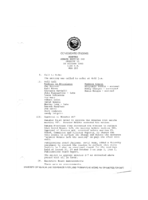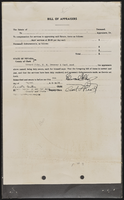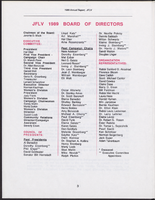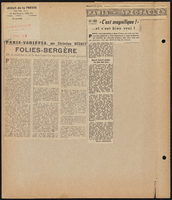Search the Special Collections and Archives Portal
Search Results
Audio clip from interview with Bess Rosenberg by Jerry Masini, November 12, 1975
Date
Archival Collection
Description
Part of an interview with Bess Rosenberg on November 12, 1975. In this clip, Rosenberg discusses her decision to move to Las Vegas and what her life was like.
Sound

Mirtha Rojas oral history interview: transcript
Date
Archival Collection
Description
Oral history interview with Mirtha Rojas conducted by Marcela Rodriguez-Campo on December 6, 2018 the Latinx Voices of Southern Nevada Oral History Project. Mirtha talks about her artistic upbringing in Cuba and how she immigrated to the Florida with her brother. She talks about relocating to Las Vegas in 2000, her membership with the Culinary Workers Union Local 226, and her employment as a guest room attendant and shop steward at the Aria Hotel and Casino.
Text

Meeting minutes for Consolidated Student Senate, University of Nevada, Las Vegas, October 18, 1983
Date
Archival Collection
Description
Text

Virginia T. Lanier interview, March 16, 1981: transcript
Date
Archival Collection
Description
From the Ralph Roske Oral History Project on Early Las Vegas collection OH-01060. On March 16, 1981, collector Heidi G. Hughes speaks to Virginia T. Lanier at the collector’s home in Las Vegas, Nevada. Lanier talks about living on the Strip in Las Vegas, Nevada in the 1950’s and 1960’s. She speaks about her experiences riding the bus, working in food service, and what the Strip was like during the time period.
Text

Transcript of interview with Harvey N. Dondero by Iskander A. Batlouni, February 26, 1981
Date
Archival Collection
Description
Text
Audio clip of Marzette Lewis
Date
Archival Collection
Description
Part of an interview with Marzette Lewis by Claytee White on October 30, 2012. Lewis discusses community involvement in the movement for equality in elementary schools to stop bussing children to schools in different neighborhoods.
Sound

Stewart family real estate documents
Date
Archival Collection
Description
Stewart family real estate documents
Text

Don Perry interview, March 05, 1978: transcript
Date
Archival Collection
Description
On March 5th, 1978, Karen Croteau interviewed Don Perry (b. 1928 in Clarksburg, West Virginia) about Paiute Indians and life on a reservation. Perry begins by mentioning his own Indian heritage with a Cherokee mother and his wife’s Paiute heritage. Perry focuses on his conversations with his wife’s grandmother, who lived on the Paiute reservation since birth, from who he learned about the reservations history. He particularly delves into the traditions of Indian burials, governing on the reservation, and the difference between an Indian reservation and an Indian colony. Additionally, he talks about recreation on the reservations, education of Paiute Indians, and how reservations have changed. Throughout the interview, Perry gives personal anecdotes about his life in connection to the Paiute people and his experiences with their traditions and belief systems. Perry ends by discussing governing politics of the Paiute reservation and the start of Las Vegas as a gambling town.
Text


